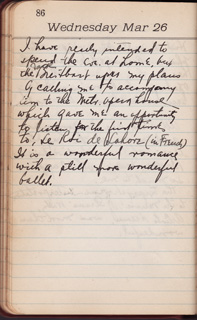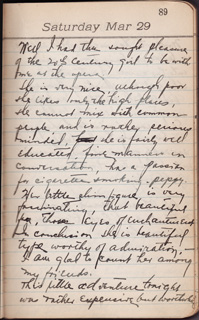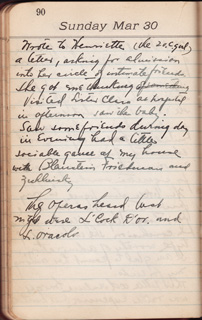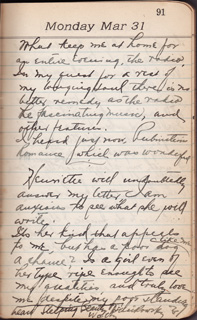
I have really intended to
spend the Eve. at home, but
(torn) Jack Breitbart upset my plans
by calling my to accompany
him to the Metr. Opera house
which gave me an opportunity
to listen for the first time
to, Le Roi de Lahore (in French)
It is a wonderful romance
with a still more wonderful
ballet.
————–
Matt’s Notes
The 1924 production of Le Roi de Lahore was regarded in its day as a spectacular trifle. The New York Times treated it as a curiosity because it had never been staged in New York and was early work by Jules Massinet (who after writing it went on to a long and storied career). In a cheeky review, the Times repeatedly described it as grand but unoriginal, notable for its bombast, spectacular sets, and (as Papa noted) its elaborate ballet:
The ballet was very elaborate and brilliant…The little children, with sprouting wings, made a pleasing episode, which could not have occurred upon the stage, in, for example the State of Massachusetts…Nor should the the admirable elephant of act four go unmentioned. His legs deserved the highest praise.
Irving Kolodin has less fun with the production in his The Story of the Metropolitan Opera (1883-1950) :
The total of works by Massenet seen in New York climbed steadily higher when Le Roi de Lahore (new in 1877) was introduced on February 29 amid and eye-filling decor by Boris Anisfeld. [Guiseppe] De Luca was an excellent Scandia, Delia Reinhardt a tasteful Sita, and Larui-Volpi sand Alim with fine vocal quality. [Louis] Hasselmans conducted acceptably, and [Rosina] Galli led an elaborate ballet with traditional charm. The fault, and it was a fundamental one, was with Massenet’s score, a weak suggestion of the man who was to write Manon. Four repetitions sufficed for Le Roi de Lahore.
Papa had a weakness for the corny and spectacular, so this story, set in 11th-Century India and full of war, palace scandal and glimpses of the afterlife, would have been a treat for him. (Especially since his friend invited him unexpectedly, kind of like the way I felt about seeing Lucinda Williams at Radio City the other night — I never would have gone on my own, but the tickets a co-worker dropped on me at the last minute softened me up quite a bit.)
——————
Additional references:
- Here’s the Times review of the 1924 Le Roi de Lahore production.
- Here’s some more information about Le Roi de Lahore.





 Speaking of which, the song this “poor dog” listened to, “Rubenstein’s Romance,” was a classical piece by Anton Rubinstein properly called “Romance in B-flat, Op. 44, No.1.” A popular adaptation known as “If You Are But a Dream” became a Frank Sinatra hit, and though this didn’t happen until the 1940’s I think the lyrics sum up Papa’s feelings about Henreitte:
Speaking of which, the song this “poor dog” listened to, “Rubenstein’s Romance,” was a classical piece by Anton Rubinstein properly called “Romance in B-flat, Op. 44, No.1.” A popular adaptation known as “If You Are But a Dream” became a Frank Sinatra hit, and though this didn’t happen until the 1940’s I think the lyrics sum up Papa’s feelings about Henreitte: This day will long be remembered
This day will long be remembered


